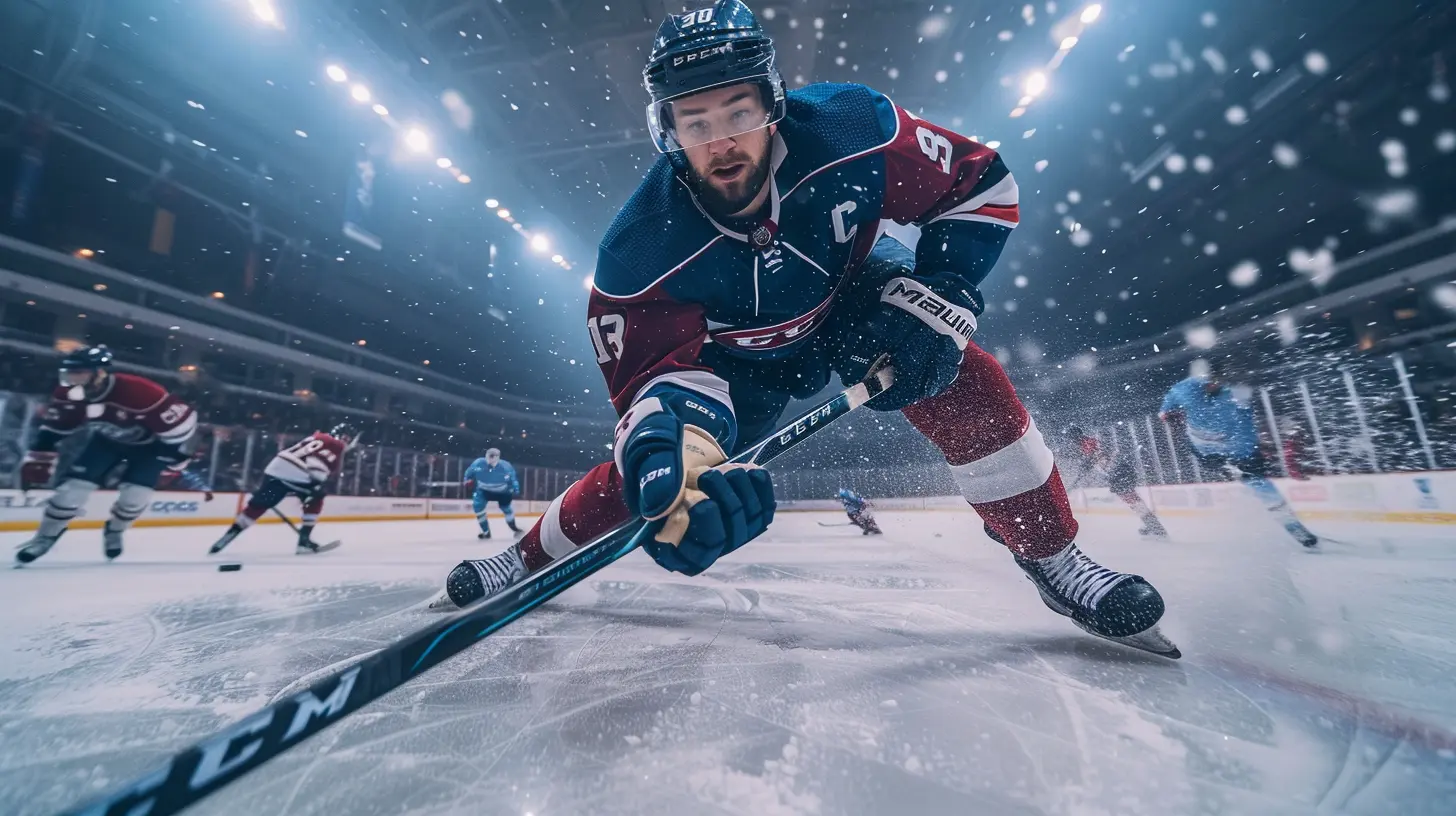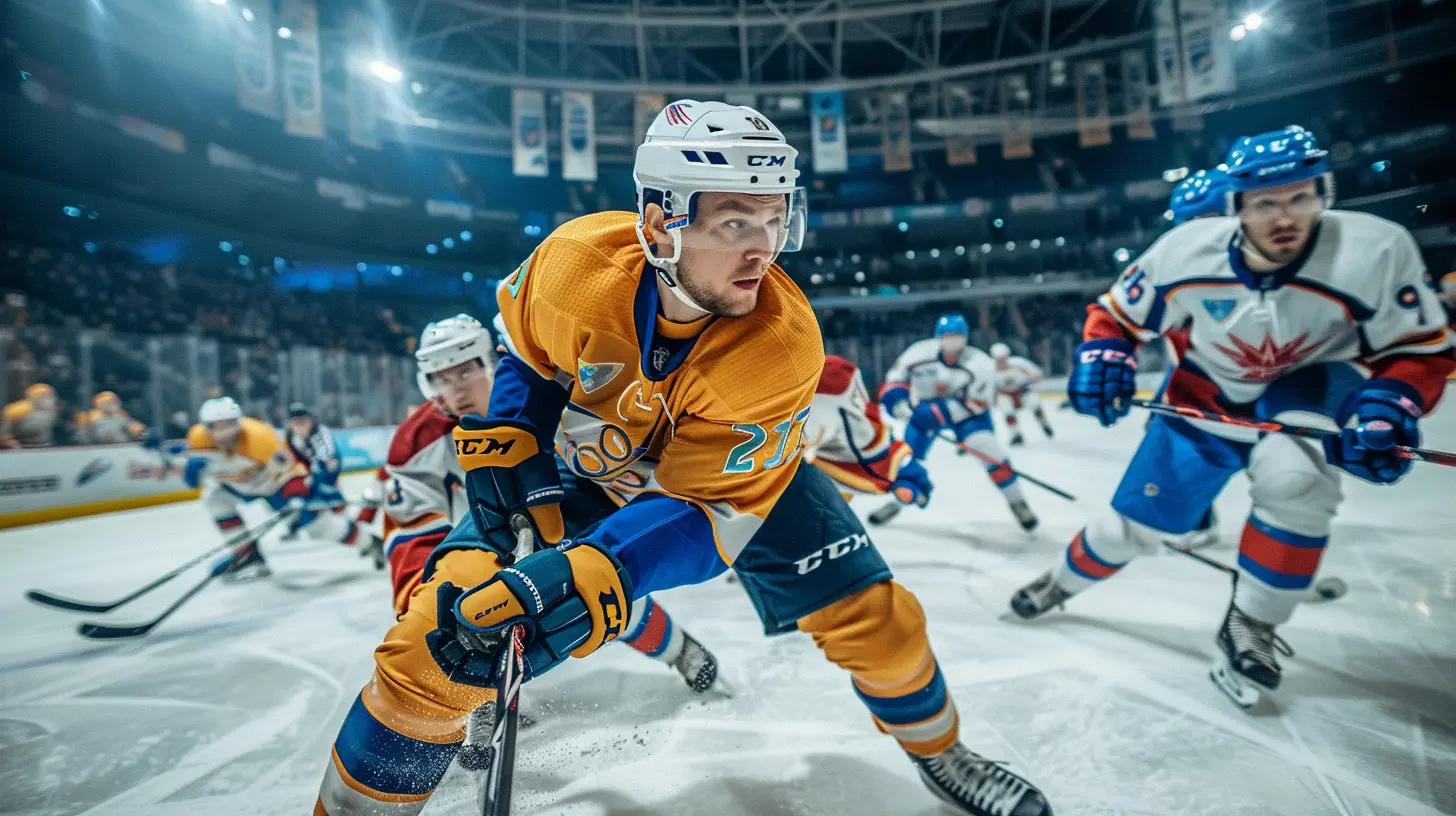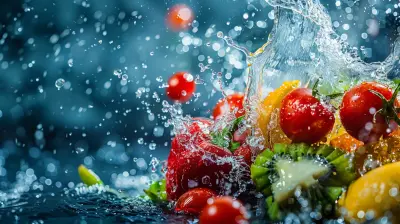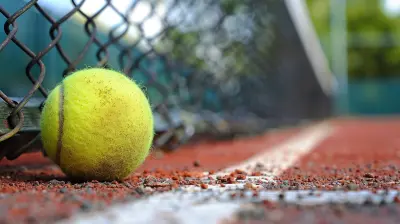The Role of Nutrition in Hockey: Fueling for Optimal Performance
22 December 2024
When we think about hockey, we often picture intense physical battles on the ice, lightning-fast skating, powerful slap shots, and, of course, those crucial game-winning goals. But what we often overlook is the fuel behind these outstanding performances. Yes, I’m talking about nutrition.
Hockey is not just about strength, speed, and skill; it’s also about what’s going on inside the body. Nutrition plays a big role in helping hockey players reach their peak performance. Just like you'd never put low-quality fuel into a high-performance race car, you wouldn't expect elite athletes to perform their best without the right nutrition fueling their bodies. So, let’s dive into the role of nutrition in hockey and how players can fuel themselves for optimal performance.

Why Is Nutrition So Important in Hockey?
Hockey is a unique sport. It demands a blend of endurance, strength, speed, agility, and mental focus. Players need to attack, defend, and react quickly for three periods, often lasting more than 60 minutes of intense play. And let’s not forget about the added strain of overtime in those nail-biting games.To handle all this, hockey players need a well-rounded diet that supports their energy needs, aids in recovery, and prepares them for the physical toll the sport takes on their bodies. Without proper nutrition, players risk fatigue, poor performance, and even injury.
It all boils down to this: hockey players need to eat not just to survive, but to thrive.

The Basics of a Hockey Player’s Diet
So, what exactly should hockey players be munching on? Well, it’s not just about eating more—it’s about eating smart. A well-balanced diet for hockey players includes the three essential macronutrients: carbohydrates, proteins, and fats, along with hydration and micronutrients like vitamins and minerals.1. Carbohydrates: The Power Source
Carbohydrates are the primary fuel source for hockey players. Think of them as the gas in the tank. When you’re playing a sport that relies on quick bursts of energy—think sprinting down the ice on a breakaway or chasing down a loose puck—the body turns to carbs for that immediate energy hit.The body stores carbohydrates as glycogen in muscles and the liver. During a game or high-intensity practice, these glycogen stores are broken down and used as energy. If a player’s glycogen stores are depleted, they may run out of steam halfway through the game. Ever seen a player look sluggish late in a match? That could be due to under-fueling with carbs.
Best Sources of Carbs:
- Whole grains (brown rice, quinoa, whole wheat bread)- Fruits (bananas, apples, berries)
- Vegetables (sweet potatoes, spinach)
- Legumes (beans, lentils)
For hockey players, loading up on carbohydrates, especially before games, is crucial to ensure they have the energy to perform at their best. A pre-game meal rich in complex carbs can make the difference between being fast and furious or feeling like you’re skating in mud.
2. Protein: The Building Block
If carbs are the gas, protein is the engine maintenance team. Hockey players need protein to repair muscle tissue, build strength, and recover from the physical demands of training and games.During a game, muscles undergo a lot of stress. Tiny tears in the muscle fibers occur, and it’s protein’s job to repair those tears and build the muscle back stronger. Without adequate protein intake, recovery slows, and muscles don’t function at their full potential.
Best Sources of Protein:
- Lean meats (chicken, turkey, lean beef)- Fish (salmon, tuna)
- Eggs
- Dairy products (Greek yogurt, cottage cheese)
- Plant-based sources (tofu, tempeh, quinoa, beans)
It’s not just about downing a protein shake after a game (although post-game protein is essential!). Hockey players need consistent protein intake throughout the day to support muscle recovery and growth.
3. Fats: The Slow-Burning Fuel
While carbs provide quick bursts of energy, fats are the slow-burning fuel that keep hockey players going during those long shifts. Fats are especially important for endurance and overall health.Healthy fats help keep the body’s metabolism in check, support brain function, and protect the body’s organs. And, let’s face it, hockey players take some hits, so keeping those organs safe is a priority!
Best Sources of Healthy Fats:
- Avocados- Nuts and seeds (almonds, chia seeds, flaxseeds)
- Fatty fish (salmon, sardines)
- Olive oil and coconut oil
It’s all about balance. Too much fat can slow digestion, but the right amount of healthy fats ensures that players have long-lasting energy to sustain them through an entire game and beyond.
4. Hydration: The Ultimate Game Changer
It’s easy to forget about hydration when we talk about nutrition, but it’s arguably one of the most important elements. Hockey players sweat a lot during games and practices, losing valuable electrolytes and fluids. Dehydration can lead to cramps, fatigue, and even impaired mental focus—all of which can tank a player’s performance.Water is the body’s natural coolant, but sometimes water alone isn’t enough. That’s where electrolyte-rich drinks come into play. These help replenish the salts lost through sweat and keep players hydrated, especially during long games.
Hydration Tips for Hockey Players:
- Drink water consistently throughout the day, not just during games.- Use electrolyte drinks when sweating heavily or playing in intense conditions.
- Avoid sugary sodas or energy drinks, which can lead to crashes.

The Importance of Timing: When to Eat
It’s not just what hockey players eat but when they eat that can make all the difference. Timing nutrition correctly ensures the body has the energy it needs and can recover quickly after games.1. Pre-Game Nutrition
Before hitting the ice, players need to top off their energy stores. Eating a balanced meal 2-3 hours before a game can ensure that glycogen stores are full and ready to be used.Pre-Game Meal Ideas:
- Grilled chicken with brown rice and steamed vegetables- Whole grain pasta with lean ground turkey and marinara sauce
- Oatmeal with bananas and a scoop of peanut butter
2. In-Game Fueling
During intense games, especially those that go into overtime, hockey players may need to refuel. Quick, easily digestible carbohydrates can provide a fast energy source.In-Game Snacks:
- Energy gels- Fruit (bananas, oranges)
- Sports drinks with electrolytes
3. Post-Game Recovery
After the final buzzer sounds, recovery begins. The body is in a state where it’s looking to repair muscles and replenish glycogen stores. Eating a mix of protein and carbohydrates within 30 minutes to an hour after the game helps kickstart the recovery process.Best Post-Game Snacks:
- Protein shake with a banana- Turkey sandwich on whole grain bread
- Greek yogurt with honey and berries

Micronutrients: The Small but Mighty Players
While macronutrients (carbs, protein, fats) get most of the attention, micronutrients are the unsung heroes of a hockey player’s diet. These include vitamins and minerals that support everything from immune function to bone health.Key Micronutrients for Hockey Players:
- Calcium and Vitamin D: For strong bones to handle the physical impact of the game.- Iron: To support oxygen transport in the blood, helping with endurance.
- Magnesium: Crucial for muscle function and preventing cramps.
- Vitamin C: Boosts the immune system and helps with tissue repair.
Eating a variety of colorful fruits and vegetables ensures hockey players get a good mix of these essential micronutrients.
Don’t Forget About Mental Nutrition
While we’ve talked a lot about the physical demands of hockey, let’s not overlook the mental side of the game. Hockey requires sharp decision-making, quick reactions, and intense focus. Believe it or not, nutrition plays a role in mental performance too.Omega-3 fatty acids, found in fish like salmon, are known to support brain health and improve cognitive function. Likewise, hydration is key for mental focus. A dehydrated brain is a foggy brain, and no one wants to make a bad pass because they’re not thinking clearly.
Conclusion
There’s no doubt that nutrition is a game-changer in hockey. From fueling the body for fast sprints down the ice to helping muscles recover after those grueling matches, what players eat directly impacts their performance. By focusing on a balanced diet rich in carbohydrates, protein, healthy fats, hydration, and essential micronutrients, hockey players can fuel their bodies for optimal performance.So, the next time you lace up those skates, remember: what you put into your body is just as important as how you perform on the ice. Make smart food choices, and you’ll be skating circles around the competition.
all images in this post were generated using AI tools
Category:
HockeyAuthor:

Umberto Flores
Discussion
rate this article
21 comments
Lorna McGee
Nutrition isn’t just a supplement; it’s the backbone of performance in hockey. If you’re not fueling right, you’re setting yourself up to fail.
March 31, 2025 at 3:42 AM

Umberto Flores
Absolutely! Proper nutrition is essential for maximizing performance and durability on the ice. Fueling the body correctly is key to achieving peak performance.
Jacob Acevedo
Nourish your body, elevate your game—hockey success starts here!
February 9, 2025 at 1:28 PM

Umberto Flores
Thank you! Absolutely, proper nutrition is essential for maximizing performance on the ice.
Primrose McGehee
Great insights! Good nutrition really is the secret sauce for hockey success!
February 3, 2025 at 12:27 PM

Umberto Flores
Thank you! Nutrition is indeed essential for peak performance in hockey.
Seraphis Harper
Great insights on nutrition's impact in hockey! Proper fueling not only enhances performance but also aids recovery. Athletes must prioritize a balanced diet to maximize their potential on the ice. A game-changer for peak performance!
February 1, 2025 at 5:33 AM

Umberto Flores
Thank you! I'm glad you found the insights valuable. Prioritizing nutrition truly is essential for athletes to optimize their performance and recovery on the ice.
Xander McGinnis
Nutrition in hockey isn’t just fueling the body; it’s strategizing for victory. A well-fed player is like a well-oiled machine—ready to dominate on the ice!
January 26, 2025 at 7:35 PM

Umberto Flores
Absolutely! Proper nutrition is essential for peak performance in hockey, allowing players to maximize their energy, enhance recovery, and improve overall game strategy. A well-fueled athlete truly shines on the ice!
Nix Jones
Great article! Nutrition is the backbone of peak performance in hockey. Fueling our bodies right not only enhances stamina but also sharpens our game. Let’s skate towards success! 🏒💪
January 23, 2025 at 5:32 AM

Umberto Flores
Thank you! I completely agree—proper nutrition is vital for maximizing performance on the ice. Let’s keep pushing for excellence! 🏒💪
Eli Bellamy
Great insights! Nutrition plays such a crucial role in an athlete's performance, especially in a demanding sport like hockey. By understanding the connection between proper fueling and on-ice success, players can elevate their game. Let's all commit to nourishing our bodies for peak performance and longevity in the sport!
January 19, 2025 at 11:44 AM

Umberto Flores
Thank you! I'm glad you found the insights valuable. Proper nutrition truly is key to maximizing performance and longevity in hockey. Let's keep fueling our passion for the game!
Lydia McNeely
Who knew the secret to scoring goals was hiding in a salad? Forget the Gatorade; it’s all about kale power! If hockey players traded their energy drinks for smoothies, they’d be gliding on ice like butter on toast. Here’s to fueling up for slap shots and snacking on success!
January 15, 2025 at 1:47 PM

Umberto Flores
Absolutely! Nutrition plays a crucial role in athletic performance, and incorporating nutrient-dense foods like kale can enhance energy and recovery. Here’s to smarter fueling for peak performance on the ice!
Colton Stone
“Eating kale won’t make you skate faster, but pizza might help! 🍕🏒”
January 10, 2025 at 12:51 PM

Umberto Flores
While pizza may provide quick energy, focusing on balanced nutrition, including greens like kale, supports overall performance and recovery in hockey. 🍏🏒
Quincy Cruz
Nutrition is the foundation of athletic performance; proper fueling enhances endurance, recovery, and focus, ultimately elevating a player's game on the ice.
January 8, 2025 at 1:22 PM

Umberto Flores
Absolutely! Proper nutrition is crucial for maximizing performance, as it supports endurance, aids recovery, and sharpens focus, all essential for success on the ice.
Zinnia Robinson
Great article! Nutrition plays a crucial role in enhancing performance and recovery in hockey. Players must prioritize a balanced diet.
January 4, 2025 at 8:40 PM

Umberto Flores
Thank you! I appreciate your feedback and completely agree—nutrition is essential for maximizing performance and recovery in hockey.
Indigo Pacheco
Great article! Nutrition plays a crucial role in optimizing performance on the ice. It's inspiring to see a focus on how proper fueling can elevate athletes to their best!
December 31, 2024 at 7:15 PM

Umberto Flores
Thank you! I'm glad you found it inspiring—nutrition truly is essential for peak performance in hockey!
Zephira McCray
This article effectively highlights the critical link between nutrition and performance in hockey. However, it could delve deeper into specific dietary regimens employed by elite players to optimize energy levels and recovery.
December 29, 2024 at 3:21 AM

Umberto Flores
Thank you for your feedback! I appreciate your suggestion and will consider exploring specific dietary regimens used by elite players in future articles to provide deeper insights.
Lana McCabe
Great article! It's so important to highlight how nutrition impacts performance in hockey. Proper fueling not only enhances endurance and strength but also aids recovery. Understanding the right balance can truly elevate a player's game. Thanks for shedding light on this vital aspect of sports!
December 28, 2024 at 5:55 AM

Umberto Flores
Thank you for your thoughtful insights! I completely agree—nutrition is key to maximizing performance and recovery in hockey.
Xavi Scott
Oh sure, because who needs skill and practice when you can just chug kale smoothies and call it a day? Forget the ice time—let’s just set up a salad bar in the locker room and watch the magic happen! 🍏🏒
December 27, 2024 at 8:53 PM

Umberto Flores
While skill and practice are essential, proper nutrition like kale smoothies can enhance performance and recovery, making it a valuable part of a holistic training approach. 🍏🏒
Corinne Turner
Great article! Nutrition is such a game-changer for hockey players. Fueling the body right boosts performance and keeps the energy high! 🏒🥳
December 26, 2024 at 11:27 AM

Umberto Flores
Thank you! I'm glad you found the article helpful. Nutrition truly is vital for maximizing performance on the ice! 🥇🏒
Myles McMurtry
Oh sure, because nothing says "elite athlete" like a perfectly balanced diet. Forget hours of practice—just whip up a kale smoothie, and you’ll be scoring goals like Gretzky. Who knew avocados were the true MVPs of the ice? Bon appétit, hockey heroes!
December 25, 2024 at 5:09 AM

Umberto Flores
While practice is essential, nutrition plays a crucial role in maximizing athletic performance. A balanced diet fuels the body, aiding recovery and enhancing endurance on the ice. Both aspects are vital for success!
Theodora Blair
Ah yes, because nothing says 'elite athlete' like a power bar and a protein shake. Forget skills; just munch your way to the Stanley Cup! Bon appétit, hockey stars!
December 24, 2024 at 5:07 AM

Umberto Flores
Nutrition is a crucial part of an athlete's training regimen, supporting performance and recovery just as much as skill development.
Eloise Mahoney
Great article! Nutrition is vital for athletes, and understanding how it impacts hockey performance is crucial. Proper fueling can elevate the game and enhance overall well-being. Keep it up!
December 23, 2024 at 9:55 PM

Umberto Flores
Thank you for your kind words! I'm glad you found the article insightful. Proper nutrition truly is key for optimal performance in hockey.
Delta Hamilton
Eat like a champion, skate like one!
December 23, 2024 at 5:10 AM

Umberto Flores
Absolutely! Nutrition is key to maximizing performance on the ice. Eat well to skate your best!
Laura Lopez
Nutrition is crucial for peak performance in hockey; athletes must prioritize their diets to enhance endurance and strength effectively.
December 22, 2024 at 4:52 AM

Umberto Flores
Absolutely! Proper nutrition is essential for hockey players to maximize their endurance and strength, ultimately enhancing their overall performance on the ice.
MORE POSTS

Fueling for Success: Optimizing Your Diet for Peak Performance

The Rise of Social Media in the World of Tennis

Stadium Safety: How Modern Arenas Keep Fans Secure
Tennis Fashion: A Look at Iconic Outfits Over the Decades

How Luxury Suites Are Redefining the Stadium Experience

The Benefits of Full-Body Workouts vs. Split Routines

How Virtual Coaching is Changing the Way Athletes Train

The Benefits of Playing Golf for Mental Health and Wellbeing

How to Dominate the Net: Serve and Volley Like a Pro

The Evolution of Modern Stadium Design

The Role of Minor League Baseball in Developing Future Stars

The Intensity of the Rivalry: Lakers vs. Clippers in Los Angeles

Smart Stadiums: How Technology is Transforming the Fan Experience